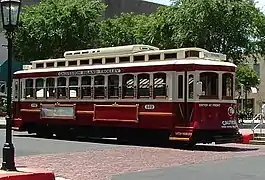Galveston Island Trolley
The Galveston Island Trolley is a heritage streetcar network in Galveston, Texas, United States. As of late 2006, the total network length was 6.8 miles (10.9 km) with 22 stations. The Galveston Island Trolley is operated by Island Transit. The rail system reopened in 2021, after having been out of service for 13 years following severe damage caused by Hurricane Ike in 2008. Subsequent to the 2008 closure, the Federal Emergency Management Agency (FEMA) and the Federal Transit Administration agreed to fund repairs.[1] In January 2017, a contract was approved to restore three of the trolleys at a cost of $3.8 million.[2] At that time, the trolleys were expected to be ready to return to service in 2018,[3][4] but the date was later postponed to 2019[5] and later to 2021. By November 2020, two reconditioned trolleys had returned to Galveston.[6] The line reopened for service in October 2021, limited to three days a week for now.
| Galveston Island Trolley | |
|---|---|
 | |
| Overview | |
| Status | Operating |
| Owner | City of Galveston |
| Locale | Galveston, Texas |
| Stations | 22 |
| Website | Island Transit |
| Service | |
| Type | Heritage streetcar |
| Services | 1 |
| Operator(s) | Island Transit |
| Rolling stock | 4 Miner Railcar replica trolleys |
| History | |
| Opened | July 23, 1988 |
| Closed | September 2008 |
| Reopened | October 1, 2021 |
| Technical | |
| Line length | 6.8 miles (10.9 km) |
| Character | street-running |
| Track gauge | 4 ft 8+1⁄2 in (1,435 mm) |
| Electrification | none |
History
Galveston has had streetcars before. The first urban rail public transit system was introduced in 1868. The cars were pulled by mules. In 1891, electric trolleys were introduced, which remained in service until May 1938.[7]
Galveston Island Trolley, a heritage streetcar system, was opened on July 23, 1988.[8] Barry Goodman Associates (now the Goodman Corporation) was a key consultant in the creation of the Trolley, leading the early design studies and helping to secure funding. The project was designed by HNTB, engineers, who were responsible for all aspects of track and vehicle design; Ochsner Associates, architects, who were responsible for the maintenance facility and the passenger shelter (on 20th Street).
Initially, the Galveston Island Trolley connected the historic Strand District on the north side of Galveston Island with the Seawall beach area. It was mainly used by tourists. In the 1990s, planning for an extension of the line began and was completed in 1995.[8] A new branch to the University of Texas Medical Branch (UTMB) opened on March 14, 2005.[8] This line was popular among UTMB staff, students and patients.
Rolling stock
The Galveston Island Trolley cars look like vintage electric trolleys, but are actually modern-built and diesel-electric powered. Because of this, there are no overhead wires. This means that the vehicles are not technically trolleys (since they do not "troll" for power from overhead wires), but rather streetcars.[9]
The Galveston trolley fleet consists of four cars. All of them are identical, though they are painted in different colors. The cars were built by Miner Railcar, Pennsylvania.[10] Each car can accommodate up to 80 passengers; 40 sitting and 40 standing. Cars are designed for an operational speed of 25 mph (40 km/h). Each car weighs 63,000 lb (29,000 kg).[10]
In 2005, all cars were equipped with air conditioning.
Between 2017 and 2021, three of the four cars were extensively restored by the Gomaco Trolley Company.[6]
Hours of operation
The trolley service was restarted on October 1, 2021, running on Fridays, Saturdays and Sundays from 10:00 a.m. to 7:00 p.m.[11][12]
Service had been suspended in 2008 when the cars and tracks sustained heavy damage from Hurricane Ike. Substitute service with replica buses was later put into place during the restoration process of the rolling stock.[12]
References
- Rhiannon Meyers (January 8, 2010). "FEMA to pay $200 million for infrastructure". Galveston County Daily News. Archived from the original on January 14, 2010. Retrieved January 8, 2010.
- Samantha Ketterer (January 26, 2017). "On the road again: Galveston City Council approves trolley contract". Galveston County Daily News. Retrieved January 28, 2017.
- Bryan Kirk (March 24, 2017). "Trolley makes comeback to Galveston Island". Patch.com. Retrieved April 2, 2017.
- Darla Guillen (March 24, 2017). "Trolley-buses to roll into Galveston by Mid-May". www.masstransit.org. Archived from the original on April 3, 2017. Retrieved September 28, 2018.
- Tony Brooks, John Wayne Ferguson (September 16, 2018). "Under repair in Iowa, trolleys could roll again in 2019". Galveston County Daily News. Archived from the original on September 17, 2018. Retrieved September 28, 2018.
- Roane, Lee (October 23, 2020). "Shiny Red Historic Trolley 502 Arrives". www.galveston.com. Retrieved November 21, 2020.
- "Galveston Trolley - Past to Present". Rosenberg Library Museum. Retrieved April 12, 2023.
- "Island Transit Information". Island Transit. Archived from the original on July 14, 2014. Retrieved August 21, 2013.
{{cite web}}: CS1 maint: unfit URL (link) - "Definition of TROLLEY". www.merriam-webster.com. Retrieved April 12, 2023.
- Wilkins, Van (Spring 1996). "Heritage Trolleys in Memphis and Galveston". The New Electric Railway Journal. Free Congress Foundation. ISSN 1048-3845. Retrieved May 27, 2011.
- Simone, Sydney (October 1, 2021). "Historic Galveston Trolley opens after being closed since Hurricane Ike". KIAH. Archived from the original on October 6, 2021. Retrieved October 8, 2021.
- Rouege, Ciara (October 1, 2021) [original date September 27]. "Back on track: Rail trolleys returning to Galveston today, and the first weekend will be free". KHOU. Archived from the original on October 6, 2021. Retrieved October 8, 2021.
- Jon Bell: Galveston Island Trolley
- Trams 2007 by B.A. Schenk and M.R. Van Den Toorn. Alk publishings, Netherlands, ISBN 90-6013-466-4 (book in Dutch)
- RPR Consulting: Galveston Island Trolley